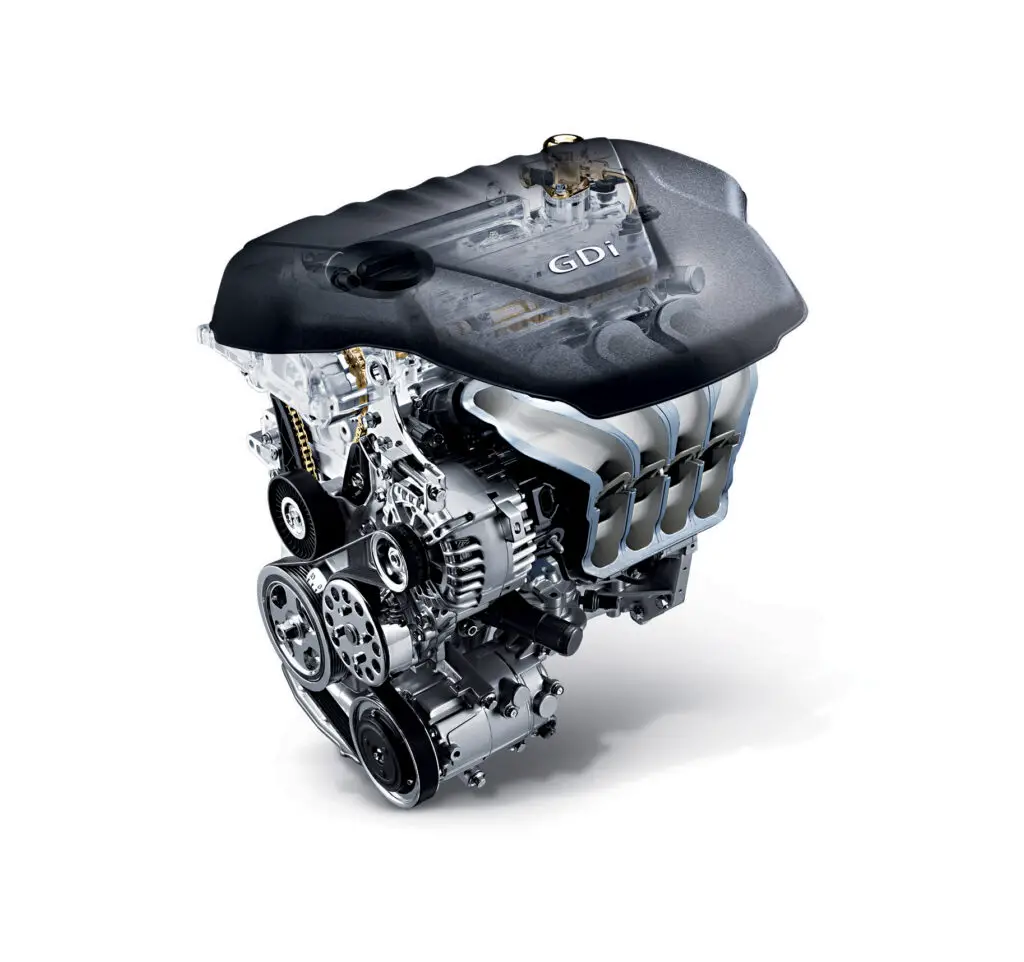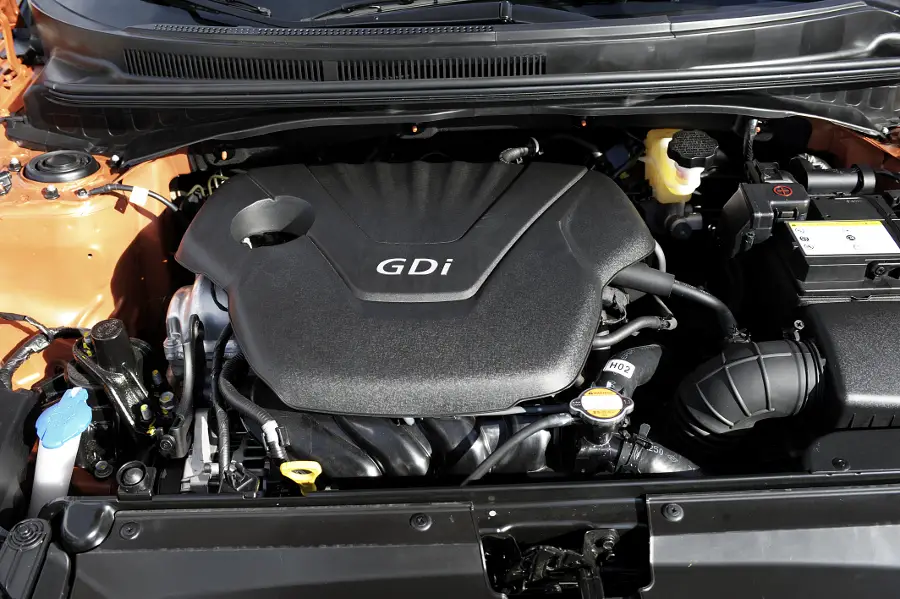Hyundai GDI engines are known for efficiency but can experience issues like carbon buildup on intake valves, excessive oil consumption, and timing chain tensioner failure. These problems can cause rough idling, reduced power, and engine knock.
Hyundai’s GDI (Gasoline Direct Injection) engines have become popular for their efficiency, power, and improved fuel economy. These engines deliver fuel directly into the combustion chamber at high pressure, allowing for more precise fuel control and better performance. However, as with any advanced technology, Hyundai’s GDI engines come with their own set of issues that have been reported by drivers and technicians.
In this post, we’ll explore the common problems associated with Hyundai GDI engines, why these issues arise, how to address them, and answer some frequently asked questions.

Contents
What is a GDI Engine?
Gasoline Direct Injection (GDI) engines inject fuel directly into the combustion chamber rather than through a pre-mixed air/fuel intake. The high-pressure system in a GDI engine allows for more precise control over the combustion process, leading to improved performance, increased fuel efficiency, and reduced emissions compared to traditional port fuel injection systems. Hyundai began implementing GDI technology in many of its models starting around 2010, including popular models like the Sonata, Tucson, and Santa Fe.
Despite the advantages, GDI engines are prone to specific issues primarily because of their high-pressure fuel injection and design. While GDI engines are efficient and powerful, some drawbacks can include carbon buildup, fuel system issues, and even potential engine failure.
Common Hyundai GDI Engine Problems
Let’s delve into some of the most frequently reported issues with Hyundai GDI engines, their causes, and what drivers can do to manage or avoid these issues.
1. Carbon Buildup on Intake Valves
One of the most common issues with GDI engines, including Hyundai’s, is carbon buildup on the intake valves. Unlike traditional port-injected engines, GDI engines don’t allow gasoline to wash over the intake valves, which would normally help keep them clean. Over time, carbon deposits build up on the valves, causing poor airflow, engine misfires, reduced power, and even engine hesitation.
Symptoms:
- Rough idling or misfires
- Decreased fuel efficiency
- Check engine light may illuminate
Solution: To prevent or reduce carbon buildup, Hyundai recommends regular intake cleaning or adding a fuel system cleaner. Walnut blasting, a procedure where crushed walnut shells are used to clean the valves, is another effective but more costly solution. It’s generally recommended every 50,000 miles, but intervals can vary depending on driving conditions.
2. High Pressure Fuel Pump (HPFP) Failure
The high-pressure fuel pump (HPFP) is essential to a GDI engine’s operation, supplying fuel at the high pressures needed for direct injection. However, HPFPs in Hyundai GDI engines have been known to fail prematurely, particularly in older models. When the HPFP fails, the engine may lose power or experience stalling.
Symptoms:
- Engine stalling or hard starting
- Loss of power during acceleration
- Reduced fuel efficiency
Solution: Replacing a faulty HPFP is often the only solution. If you’re experiencing any of these symptoms, it’s best to have the fuel pressure checked by a professional mechanic. Regular maintenance and fuel filter replacements can also help extend the life of the HPFP.
3. Knocking or Pinging Sound in the Engine
Another frequent complaint among Hyundai GDI engine owners is the presence of engine knocking or pinging sounds, especially under acceleration. This sound often results from pre-ignition or “engine knock,” where fuel combusts prematurely in the cylinder, causing a loud metallic noise. GDI engines are more prone to this issue due to their higher compression ratios.
Symptoms:
- Knocking or pinging noise, especially when accelerating
- Reduced engine power
- Higher emissions
Solution: In many cases, this can be addressed by using higher-octane fuel, which has a greater resistance to premature combustion. Using fuel additives specifically designed for GDI engines may also help. Additionally, ensuring regular oil changes and spark plug replacements can minimize the risk of pre-ignition issues.
4. Excessive Oil Consumption
Some Hyundai GDI engines have been reported to consume oil at an unusually high rate. The direct injection process can lead to incomplete combustion or even leakages through worn piston rings. Excessive oil consumption can cause problems with emissions, reduce fuel efficiency, and, if left unchecked, lead to severe engine damage.
Symptoms:
- Low oil levels between oil changes
- Blue smoke from the exhaust
- Reduced fuel economy
Solution: Regularly check your oil level and top it up as needed. If excessive oil consumption persists, a mechanic should inspect the engine for worn piston rings or other underlying issues. In extreme cases, an engine rebuild or replacement may be necessary.
5. Timing Chain Tensioner Failure
Timing chain tensioners in some Hyundai GDI engines have been known to fail prematurely, leading to issues with engine timing and, in severe cases, catastrophic engine failure. This problem is particularly concerning as it can lead to the timing chain skipping or breaking entirely, causing serious engine damage.
Symptoms:
- Rattling noise from the engine
- Check engine light
- Poor engine performance or misfires
Solution: Replacing the timing chain tensioner as part of routine maintenance is recommended to avoid this problem. If you hear a rattling noise coming from the engine, it’s essential to have it checked immediately to prevent further damage.

Preventative Maintenance Tips for Hyundai GDI Engines
Hyundai GDI engines can perform optimally if well-maintained. Here are some maintenance tips to keep your GDI engine running smoothly:
- Regular Oil Changes: GDI engines can be more sensitive to oil quality, so adhere strictly to the oil change intervals and use high-quality synthetic oil.
- Use High-Octane Fuel: While Hyundai may not always require it, using higher-octane fuel can reduce knocking and improve performance.
- Clean Intake Valves: Periodic cleaning, such as walnut blasting, can significantly reduce carbon buildup on intake valves.
- Replace Fuel Filters and Spark Plugs: Maintaining these components can improve engine performance and reduce wear on other parts.
- Inspect Timing Chain Tensioner: Regularly check or have your mechanic inspect the timing chain tensioner to avoid timing-related issues.
Frequently Asked Questions
Here are some FAQs about Hyundai GDI engines –
1. Why does my Hyundai GDI engine consume so much oil?
Excessive oil consumption in Hyundai GDI engines may be due to worn piston rings, which allow oil to enter the combustion chamber. This issue requires frequent oil checks and, in severe cases, might involve replacing piston rings or other internal components.
2. Can I use regular gasoline in my Hyundai GDI engine?
While Hyundai may allow regular gasoline in some models, using high-octane fuel can help prevent knocking and improve performance, especially in engines with higher compression ratios. Consult your vehicle’s manual for specific fuel recommendations.
3. How often should I clean the intake valves on my Hyundai GDI engine?
Intake valve cleaning is recommended every 50,000 miles, but the interval depends on driving conditions and fuel quality. If you notice a decrease in performance, misfires, or rough idling, intake cleaning may be due.
4. How can I prevent carbon buildup in my Hyundai GDI engine?
Using high-quality fuel, adding fuel system cleaners, and regularly cleaning the intake valves can help reduce carbon buildup. Walnut blasting is an effective method to remove deposits if buildup becomes severe.
5. Are Hyundai GDI engine problems covered under warranty?
Many Hyundai models with GDI engines are covered by extended warranties, especially if they fall under recalls or technical service bulletins. It’s best to check with a Hyundai dealership regarding your specific model and any applicable warranties.
Conclusion
Hyundai GDI engines offer strong performance and fuel efficiency but can experience issues, primarily related to carbon buildup, high-pressure fuel pumps, and timing chain tensioners. By following a regular maintenance schedule, using high-quality fuel and oil, and keeping up with intake cleaning, you can avoid many of the common issues associated with these engines.
If you encounter persistent issues with your Hyundai GDI engine, consult with a trusted mechanic or your dealership to ensure any potential warranty coverage.